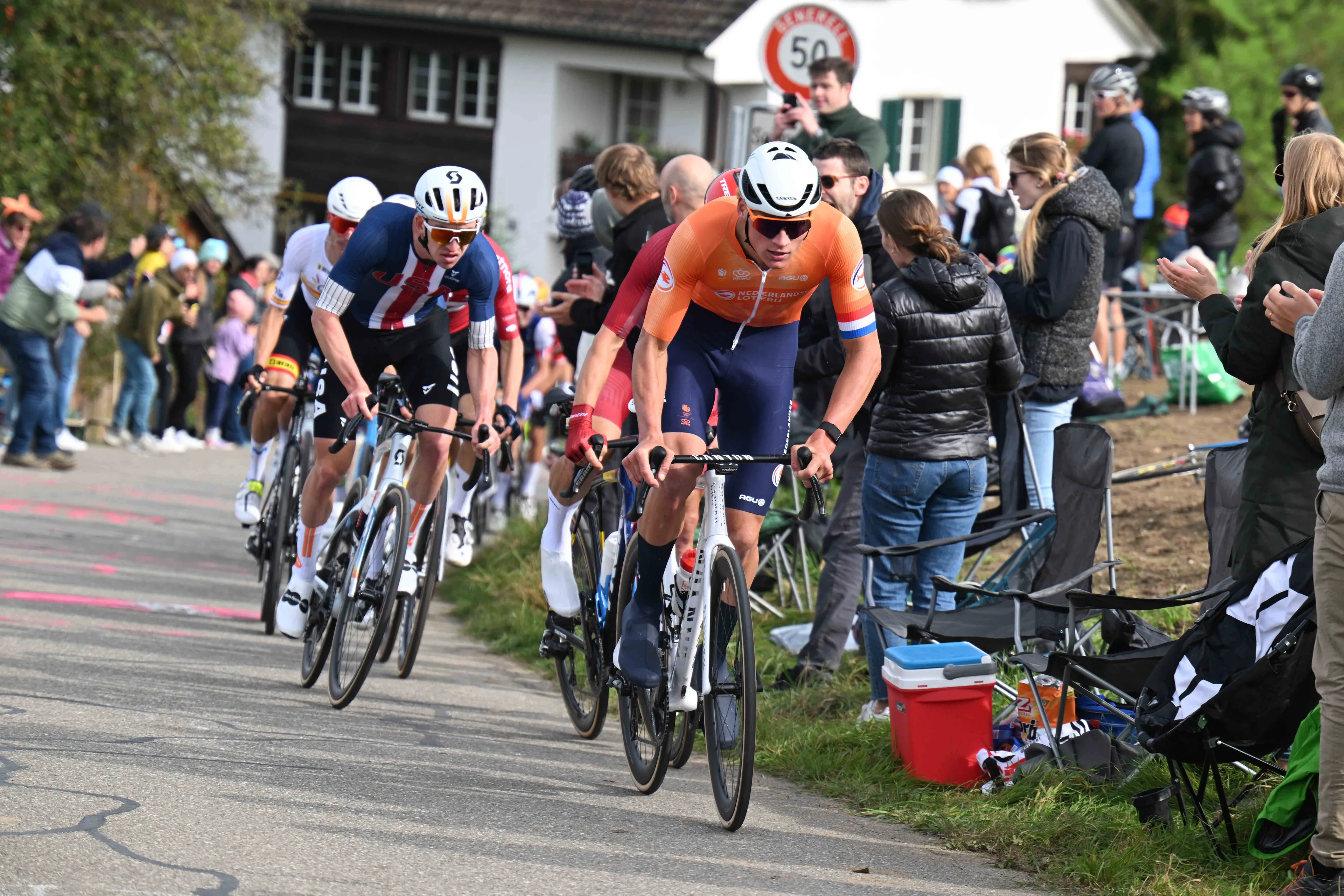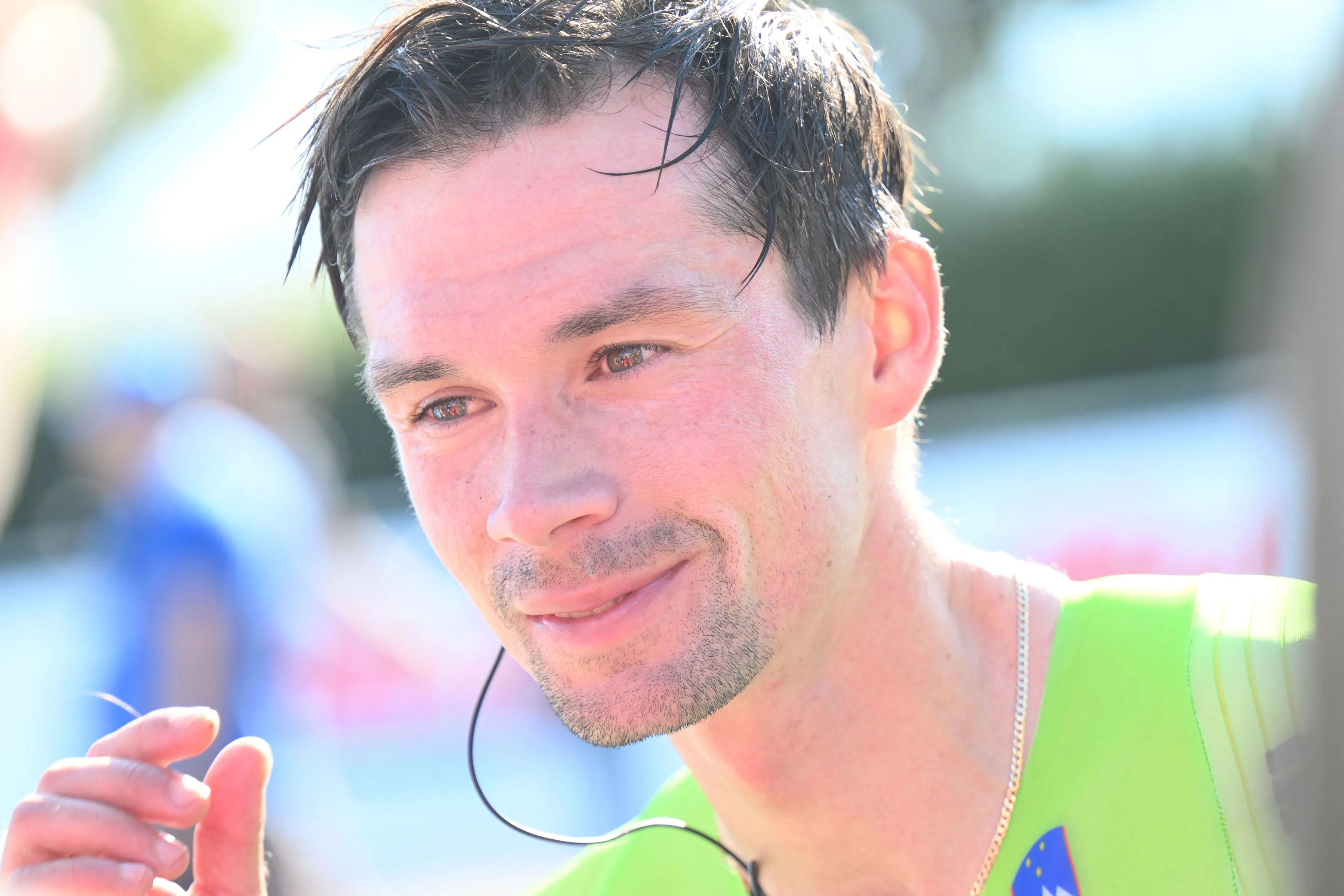Vollering did not accomplish her goal, but these questions may also be asked after Dutch World Championship debacle
CyclingMonday, 30 September 2024 at 09:05
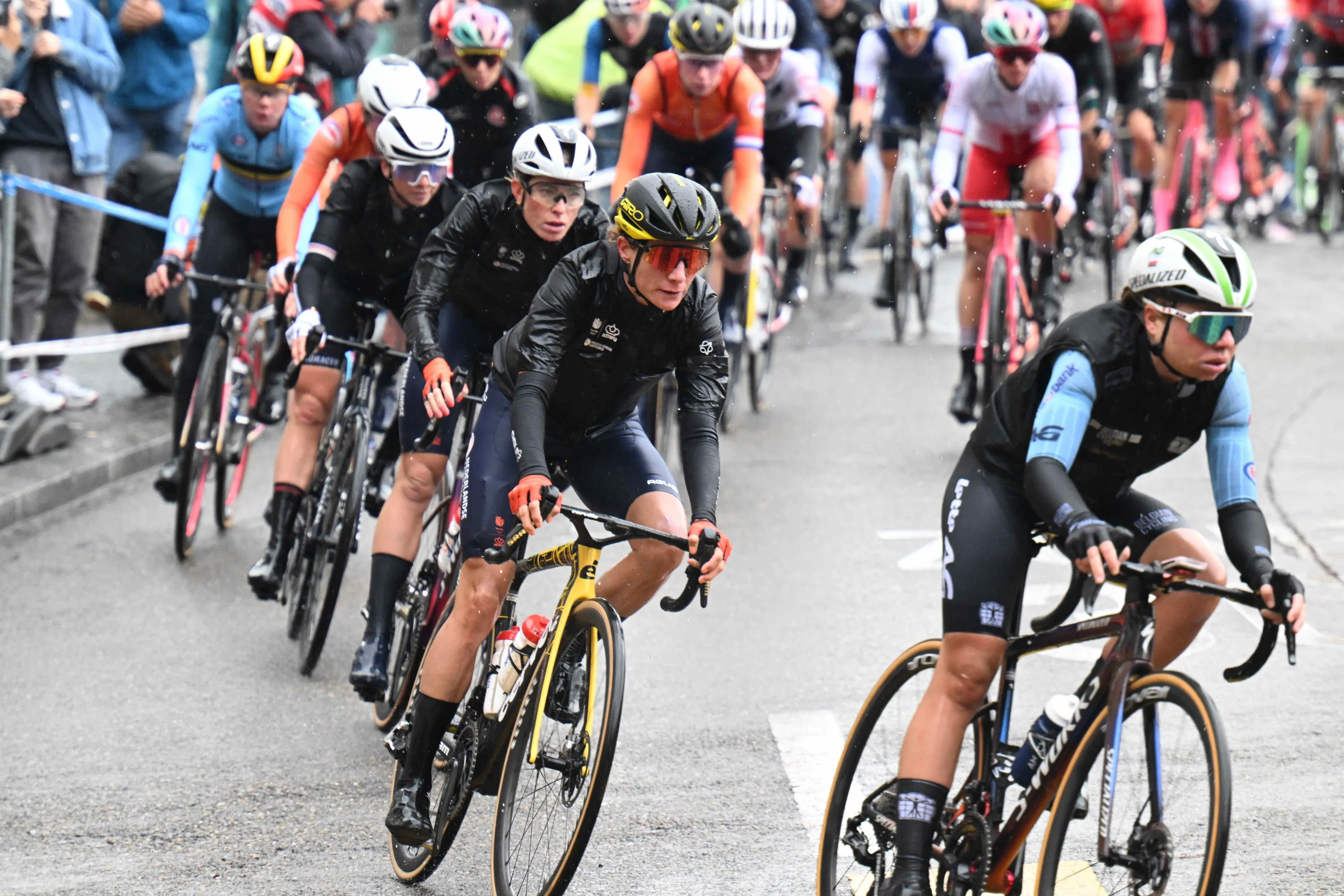
On Saturday, the elite women's cycling World Championship went completely haywire for the Netherlands. Demi Vollering was seen as the absolute "bad guy" after the race, which was perhaps emphasized a bit too much. The leading lady did not do everything right - and maybe even a lot wrong - in the final by any means, but other questions may certainly be asked after the disappointing Zurich World Championship.
First, here is just a little recap of Saturday. As it was clear beforehand, the Netherlands went to Switzerland for nothing less than the gold medal and rainbow jersey. Throughout the course, there were several situations where the orange ladies seemed to be in control. Still, eventually, everything slipped out of their hands on the final lap of 27 kilometers around Zurich.
How could things go so wrong? Demi Vollering seemed unstoppable by anything or anyone in her hunt for gold and raced as she always did: going full throttle. Forward riders Marianne Vos and Riejanne Markus were caught and finally eliminated uphill by the actions of their compatriot, who then could not finish in the strong group of six. This most unusual situation deserved interpretation.
Was the role distribution for the Netherlands set right beforehand?
Vollering, who lives in Meggen, Switzerland, was clear the day before the title match. "Eventually, the ultimate goal is gold for the Netherlands, but from the moment I heard that the World Championship was in Switzerland, I already knew I wanted to go for it all the way," she announced. 'It would be super nice to become world champion now, preferably as soon as possible."
At the end of August, national coach Loes Gunnewijk made the selection public, and one name was put forward. "Demi is our leading lady," it sounded clear. "The course of the road race is challenging. With 2,400 meters of elevation, it promises to be a tough course, where Demi will ride for gold with the team."
So, besides Vollering, what did the role distribution look like? Pieterse and Vos were seen as protected riders, Markus was the course captain, and Pauliena Rooijakkers, Thalita de Jong, and Mischa Bredewold were domestiques. "We can certainly also play off Puck or Marianne. And we must also have the courage to do that because many riders will look to me," Vollering clarified. "If everyone knows and performs their task, a good result should be able to emerge," Pieterse said in advance. So the roles were clear, but were they set right?
To what extent did the weather conditions affect them?
Thalita de Jong was the first to do her job on behalf of the Netherlands, but she was ultimately the only orange lady who failed to finish the race. The reason? Cold. "I did my job at the race's beginning, but the cold got to me. After a hundred kilometers, my body couldn't take it anymore: I couldn't see well, had no strength or air, and felt miserable."
Bredewold spoke of an error in judgment regarding the rainy and cold conditions. "It was cold, tough. At first, it wasn't too bad, and everyone took off their rain jackets, but that was a mistake. It was terrible; I didn't feel anything at one point," said the SD Worx-Protime rider.
That it was tough was more than apparent afterward. Bredewold was shivering, so there was little left of the tea, while Vos and Vollering also spoke to the press in shivering voices. Winner Kopecky, by the way, started with a (warmer) time trial suit, while number three, Elisa Longo Borghini, chose to eat and drink a lot more than a typical race just to stay warm. But there is no question: the cold and rain obscured the riders' view of the race and made it more of a survival of the fittest.
Number two, Chloé Dygert: "The fact that I fell behind on the last lap ultimately helped me stay warm. All I had to do was cycle hard to get back."
Could it sometimes just be an unfortunate coincidence?
About a hundred kilometers from the end, the Dutch women created a first-chance situation. Markus rode away—with Belgium's Justine Ghekiere as a watchful eye—in a group with Niamh Fisher-Black, Sarah Gigante, Elena Hartmann, Urska Zigart, and Soraya Paladin, after which Bredewold was also able to move to the front moments later.
On Zürichbergstrasse - the steep climb at the beginning of the lap - Rooijakkers in the peloton behind did what she was instructed to do: ride in front of Vollering to make the race hard, with which she raced to her compatriots riding in front of her in one go. The fact that Pieterse rode up front in the group behind that again caused Markus, Rooijakkers, and Pieterse to ride in front in the orange in the first three groups.'
In Pieterse's case, this was due to a mechanical problem, forcing her to inform her teammates that her race was probably over. "I had to go up on the outer chainring, so I rode up those hills, but I knew the Bergstrasse wouldn't work. So I switched bikes and told the ladies that they probably wouldn't see me again, so it wasn't crazy for them to be upfront either," she was honest afterward. One lap later, Rooijakkers pulled ahead again, after which Vollering took over. And there firmly ripped apart the peloton, including all her compatriots.
Was the SD Worx doctrine followed correctly by cycling instead of not cycling everywhere?
Because the leading group repeatedly came to a standstill, all these ladies returned to the front on the second-to-last lap. Markus took advantage of this with an intelligent attack - with Ghekiere in her wake - after which Vos crossed the line with Australian Ruby Roseman-Gannon. Two out of four, that was quite a chance.
Yet it was Bredewold who took the lead behind, but why? "With Holland, we had agreed on a signal if there was not a good situation, and they passed on that signal when I was dropped, but I didn't know what was going on," she explained. 'So, no idea what was there, but then I came back. With that signal in mind, I started leading, but after that descent, I heard that Markus was ahead, and Vos still jumped to it."
Nevertheless, she kept riding fast, partly on Vollering's advice. "You don't want it to be two minutes either because then you can't do anything," said Bredewold, who was not called back in line until half a lap later. "In the feeding zone, they yelled that we shouldn't ride in the lead anymore, so we stopped. That was just before entering the final lap. After that, I don't know what happened.
According to Gunnewijk and Vos, that strategy was part of the plan. "In the final, we did want to put pressure on it and keep it demanding. We did that, but maybe it should have been done just a little earlier,' the national coach stated. "We did know that it would explode from behind, so up to a certain point, it was a good situation," Vos agreed to the Dutch-language press. "If you are ahead and can put pressure from behind, that could benefit Demi."
But., like Belgium's Ghekiere, they should also have kept their legs still up front. You know the proven SD Worx recipe: don't ride at the front, but don't ride at the back either.
Can we draw any conclusions based on TV footage?
Anyway, entering the final lap, Markus, Vos, Roseman-Gannon, and Ghekiere had a 58-second lead. However, in the last passage of the Zurichbergstrasse, this lead was firmly reduced. However, due to an error on the part of the Swiss direction, none of this could be seen live on TV. So, can we draw the right conclusions?
Enter Vollering. "Liane Lippert accelerated on that steep climb. Me, Elisa Longo Borghini, Lotte, and Chloé Dygert went with her," the Dutch rider revealed. Longo Borghini eventually closed the final gap to the front, with Vollering following in her wake. The SD Worx lady only took over when the ladies were in sight, but remarkably, she outshone her compatriots in the process. And indeed, that was an uncomfortable sight.
However, it also prevented her from placing her move at the moment she would have liked - the steep Zurichbergstrasse. "I have to launch my attack somewhere, which I may have done too late now," she sounded guilty. "Riejanne and Marianne were ahead, but I had to do it on the longer climb. It wasn't going fast enough there," Vollering said.
Besides, was the situation of Markus and Vos, with two out of four, still favorable? Both ladies were already exhausted. Vos dropped out for the first time just two laps from the end, while Markus was on the attack from a hundred kilometers from the finish. In the end, Roseman-Gannon and Ghekiere also finished ahead of the Dutch ladies, with the Australian even riding in front until the finish.
However, we may be underestimating the tactical element, and they could have made the climbs easier in that case.
Is it a matter of not knowing and being able to do better at Vollering?
Well, Vollering beat Vos and Markus in the last lap and then had to continue with the other five ladies: the very smart riding Kopecky, Longo Borghini, Dygert, Roseman-Gannon, and Lippert. Those first three—who eventually finished on the podium—all declared afterward that they could match Vollering's race.
"She said beforehand that she wanted to win, which was also very well reflected in the race. But, well, that's cycling. If someone wants to, you go all the time. That was it with her, I think," Longo Borghini analyzed. "I think the Dutch can work very well together, but at some moments, they just don't succeed," said Dygert, who, unlike Vos, managed to come back.
"I knew how much Demi wanted to win," declared teammate Kopecky. And that was reflected in the race's final kilometers, in which Vollering managed to dig her own grave. "Longo Borghini attacked extremely hard, and I thought the race was over, but Demi closed the gap. She rode incredibly strong, but I knew I could finish it if I could catch on."
Indeed, the Italians attacked very powerfully on the final uphill meters. "I had hoped Vollering would be smarter," she sounded afterward. For her part, the Dutchwoman talked about being unable to do anything else. "I wanted to try again on that last climb, but Longo passed me. I had to chase that because otherwise, it's also finished anyway." She then also caught up to Roseman-Gannon and started the final kilometer with the very clever Kopecky in her wheel, adding more salt to the wounds of the Dutch cycling fans.
But aren't we too hard on Vollering? Isn't it a matter of not knowing any better and not being able to do better for the Dutchwoman, who usually wins her races by brute force and didn't excel in tactics in the spring either? Of course, it was unfortunate that Vollering eliminated her compatriots, although it is also true that she had to smother her opponents with a long effort and not by furious attacks.
To pretend she threw away a world title from Vos and Markus? Were we sure about that after all the energy these ladies had already put into the race? Vos' response was significant: "I didn't have much left, so as far as that goes... If Demi then goes and they are gone, it's fingers crossed that it goes well for that. Afterward, you evaluate and say you could have done things differently here and there." That evaluation is now widespread, but also, fingers crossed that Vollering can forget this Swiss episode on the brutal course in Rwanda next year.
Read also
IDL-productions

Sanremo, a world title and the yellow jersey: Michael Matthews escaped death - and that reignited his spark
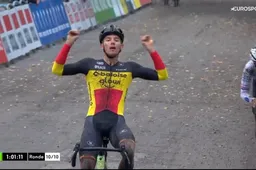
Unlike road colleagues Van der Poel or Van Aert, Nys rides twice as many cyclo-crosses: 'He doesn't want to ride only ten cyclo-crosses'
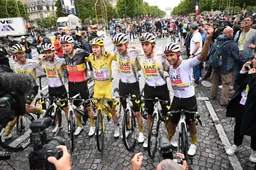
95 (or was it 97?) wins and a new record year, but losing that one race still hurts UAE Team Emirates - XRG

Former cyclocross world champion recalls wonderful memories of young Nys: "Back then we thought: that's not going to work out"

There was smoke so there was fire, but in 2026, how will Lidl-Trek make sure that fire doesn't flare up again?
Latest Cycling News
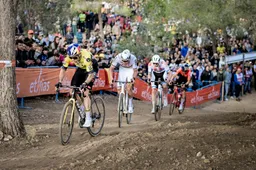
National coach on first duel Mathieu van der Poel vs. Wout van Aert

Day after tough comeback in Namen, Mathieu van der Poel is already showing his skills again
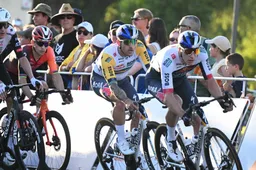
INEOS Grenadiers pleased to announce Sam Welsford: ''When we have sprinters, they’ve been pretty successful''

Skjelmose regrets statements about 'fellow nerd' Ayuso: 'I told him I was sorry'
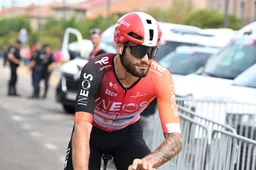
'Filippo Ganna knows ambitions for 2026: big races ahead for Italian'
Popular Cycling News
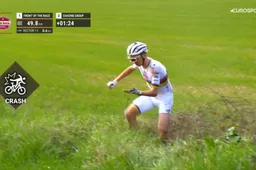
'I still clearly remember him lying on the ground, gasping for breath': Pogacar is often very lucky, but not always
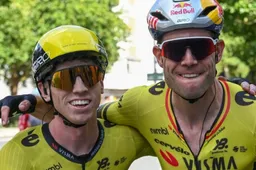
Brennan stands up for Van Aert and deliberately did not choose Van der Poel's wheel in Roubaix: "Way too skilled for me"

Former Movistar teammate was already suspicious of Lazkano: 'When it smells like shit, sometimes, its just shit'

National coach on first duel Mathieu van der Poel vs. Wout van Aert
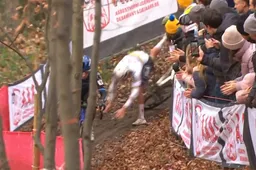
Even with Van der Poel, something can go too fast; world champion has indicated he wants a different approach for cyclocross winter
Latest Comments
- Those events are mental rest for him. Fun, without expectations. *Sagan lost his abilities because he gained weight and got lazy. Pogi will likely retire before that has a chance at happening.Veganpotter14-12-2025
- Ah, the consequences of riding for Israel.Veganpotter11-12-2025
- Pidcock could follow everyone but Pogi while finishing 3rd. No second place rider this season😃Veganpotter16-11-2025
- Now the Palestinian protestors can stop their whining. Trump came to the rescue. So they can now STFU and go back to waving the rainbow flags.raufus15-10-2025
- Cracked the code lol. If it was that easy to 'crack the code' jonny Vegas would be charging up the Kwaremont giving Pog a dose of his medicine. Evenepoel can't match pog on a climb and neither can mvdp. Anything with a half difficult climb and Pog smashes the field. Even on flat(ish)parcours like Roubaix it came down to a mistake and crash by pog to definitively crown mvdp. MSR is the only one that Pog probably won't win.kevpt10-10-2025
- We've seen this movie before. I think Pogacar is doping.DeadBlow10-10-2025
- 👍Bea08-10-2025
- 👌🏻Bea08-10-2025
- What the data doesn't show is how much of an effect drafting had for evenepoel. Pogacar went with del toro at 100km whilst Evenepoel was still in the bunch. Despite the bike changes he still had a lot of assistance getting back to the bunch. Pogacar then rode 60km solo whilst evenepoel rode with Healy/Skjelmose until going solo in thd last 10-15km. Thats ~20% less power / energy requirements for 45-50km. Apples and oranges...kevpt30-09-2025
- 👏👏Bea24-09-2025
Loading
